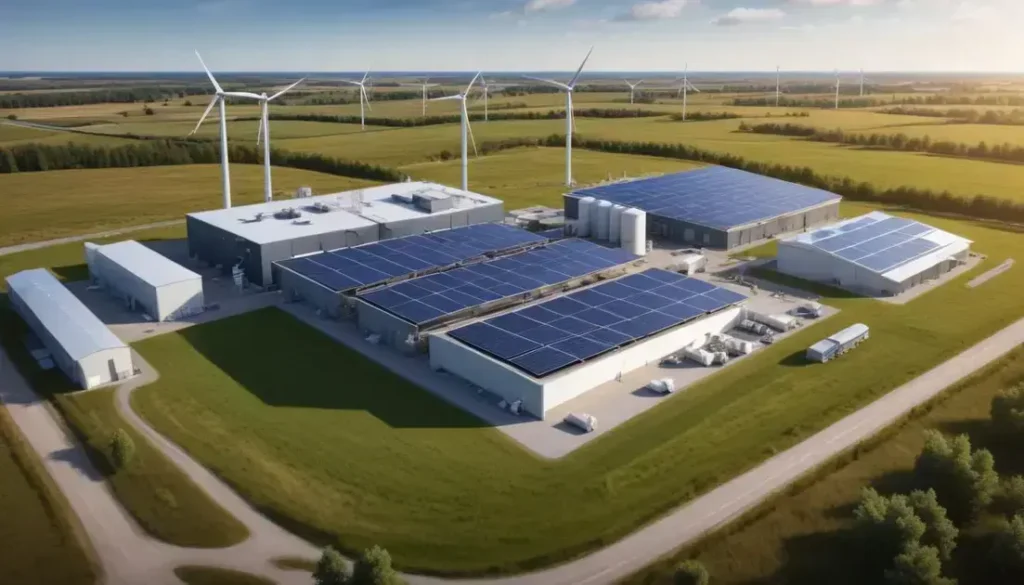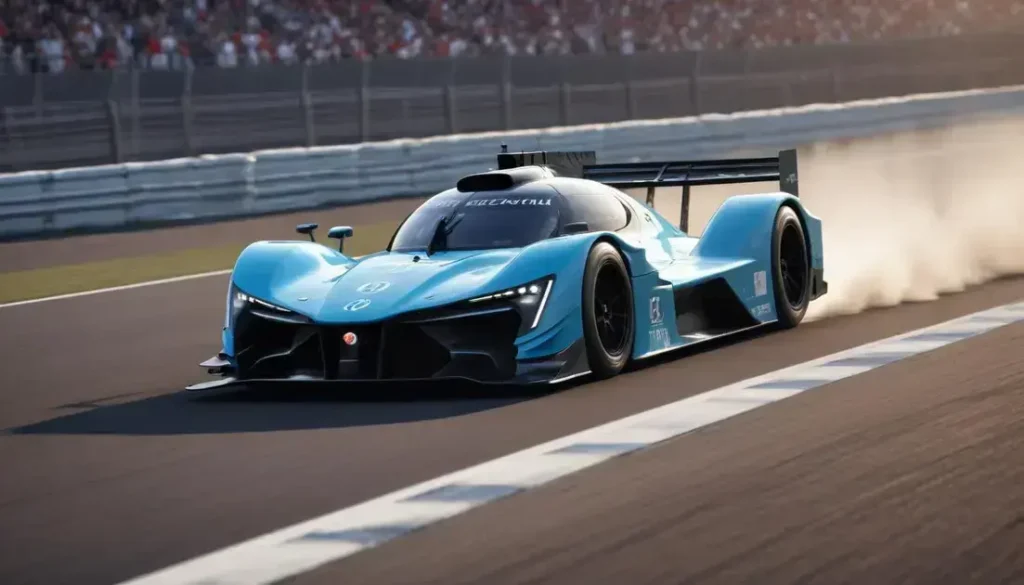The electric vehicle (EV) market is rapidly evolving, presenting significant opportunities for businesses through sustainable practices, technological advancements, and strategic partnerships that enhance competitiveness and drive consumer adoption.
The rise of electric vehicles is transforming the automotive landscape, with General Motors making significant strides. What does this mean for businesses in India?
Introduction to GM’s EV Strategy
General Motors (GM) is at the forefront of the electric vehicle revolution, committing substantial resources to redefine its automotive strategy. With an ambitious goal to transition towards sustainable mobility, GM has announced plans to invest over $35 billion in electric and autonomous vehicles by 2025. This initiative not only positions GM as a leader in the auto industry but also emphasizes its commitment to reducing carbon emissions.
No longer just a concept, GM’s transition includes launching a range of electric models across different segments. The introduction of vehicles like the Chevrolet Silverado EV and the Hummer EV showcases GM’s resolve to compete directly with key players in the market, including Tesla. The strategy is designed to attract eco-conscious consumers and stimulate interest among Indian businesses looking to export EVs.
Furthermore, GM is actively expanding its production capabilities by establishing new facilities dedicated to EV manufacturing. This includes partnerships with battery suppliers to ensure a consistent supply of necessary components. The company’s foresight in developing a comprehensive infrastructure strengthens its position in the evolving EV marketplace.
Growth of EV Sales at GM
The growth of electric vehicle (EV) sales at General Motors (GM) has been remarkable in recent years. This surge can be attributed to several factors, including increasing consumer awareness of sustainable transportation options and government incentives aimed at promoting EV adoption. As a result, GM has positioned itself to capitalize on this growing demand.
In 2022 alone, GM reported a significant rise in the sales of its electric models, particularly the Chevrolet Bolt EV, which has gained popularity for its affordability and impressive range. This model has opened doors for many first-time electric car buyers, particularly in urban areas where charging infrastructure is on the rise.
Moreover, GM’s strategic partnerships with charging network providers enhance the overall customer experience. By ensuring that EV owners have access to a reliable network of charging stations, GM effectively addresses one of the main barriers to EV adoption. This initiative not only boosts sales but also builds consumer confidence in transitioning to electric vehicles.
As GM continues to expand its electric lineup, including models like the Hummer EV and upcoming variants, experts predict this trend will accelerate. The company’s commitment to zero emissions aligns with global sustainability goals, making it an attractive option for environmentally conscious consumers.
Impact of Tesla’s Market Position
Tesla’s market position significantly influences the electric vehicle (EV) landscape. As a pioneering force in the EV sector, Tesla has set benchmarks for innovation, technology, and performance that many automakers, including General Motors (GM), aspire to meet. With its advanced battery technology and expansive supercharger network, Tesla has created a loyal customer base and strong brand identity.
This dominance impacts consumer expectations in the EV market. As buyers become accustomed to Tesla’s cutting-edge features, such as autonomous driving capabilities, other manufacturers must elevate their offerings to compete effectively. GM, for instance, is keenly aware that consumer perceptions are shaped by Tesla’s success.
Furthermore, Tesla’s pricing strategies and market trends can sway the entire industry. When Tesla adjusts its prices, competitors often follow suit to maintain market relevance. This creates a ripple effect, influencing pricing structures and profit margins across the board.
As Tesla continues to expand its market share, it encourages investments in EV infrastructure and research. Legacy automakers are prompted to rethink their strategies and accelerate their EV programs to keep pace. Tesla’s robust presence ultimately leads to an invigorated competitive environment that benefits consumers and pushes the industry toward innovative solutions.
Cassandra Garber’s Vision for Sustainability
Cassandra Garber, a key figure at General Motors, embodies a forward-thinking vision for sustainability within the automotive industry. Her approach emphasizes the essential role of electric vehicles (EVs) in combating climate change and promoting cleaner energy solutions. Garber believes that the transition to electric mobility is not just a trend but a necessity for creating a sustainable future.
Under her leadership, GM is focusing on producing a diverse range of EVs that cater to different market segments. She argues that flexibility in product offerings will drive consumer adoption and support the shift towards sustainable transportation. This includes developing affordable models that appeal to a broader audience, particularly in emerging markets like India.
Furthermore, Garber advocates for significant investments in charging infrastructure. She understands that diverse charging options are critical to alleviating consumer concerns about EV usability. By collaborating with partners to expand the charging network, GM aims to enhance the overall experience for EV users.
Garber’s vision is also aligned with regulatory trends and consumer expectations regarding corporate responsibility. By prioritizing sustainability, GM is not only positioning itself as a market leader but also contributing positively to society and the environment. Her commitment reflects a broader industry shift towards greener practices and innovation.
Key Models: Hummer and Escalade IQ
The launch of the Hummer EV and the Cadillac Escalade IQ marks a significant milestone for General Motors in the electric vehicle landscape. These models not only redefine their respective brands but also showcase GM’s commitment to electrification and innovation. The Hummer EV, known for its rugged performance and advanced technology, combines off-road capability with sustainable driving.
With impressive features like zero to sixty in approximately three seconds and an estimated range of over 350 miles, the Hummer EV is designed to meet the needs of modern consumers. Its unique features, such as the CrabWalk mode, allow for exceptional maneuverability, enhancing its appeal in both urban and off-road environments.
Similarly, the Cadillac Escalade IQ aims to elevate the luxury electric SUV segment. With a focus on comfort, technology, and functionality, this model offers a spacious interior combined with cutting-edge infotainment systems. The Escalade IQ is designed to attract consumers seeking both luxury and sustainability in their vehicle choices.
Both of these key models reflect GM’s strategy to provide a diverse range of electric options, catering to various segments of the market. By merging performance with sustainability, GM is setting a new standard in the automotive industry, appealing to eco-conscious consumers who desire power and luxury.
Chevrolet Equinox’s Role in EV Adoption
The Chevrolet Equinox is poised to play a pivotal role in the adoption of electric vehicles (EVs) within the general market. As a compact SUV, it combines practicality with advanced electric technology, making it an attractive option for families and urban commuters alike. GM aims to make the Equinox EV affordable, aligning with the demand for accessible electric mobility.
This model is designed with features that resonate with environmentally conscious consumers. The Equinox boasts impressive range capabilities, allowing drivers to travel significant distances without frequent recharging. This alleviates one of the primary concerns associated with electric vehicles — range anxiety.
Furthermore, the Chevrolet Equinox EV offers various tech-forward aspects, including enhanced connectivity and smart driving features. By integrating innovative technology, GM appeals to tech-savvy customers who seek modern conveniences in their vehicles. Features such as over-the-air updates ensure that the Equinox remains competitive and user-friendly.
By promoting the Equinox EV, GM encourages the shift toward a sustainable future, targeting consumers previously hesitant about transitioning to electric vehicles. Its combination of affordability, range, and technology positions the Equinox as a catalyst for widespread EV adoption, contributing positively to the electric vehicle landscape.
Market Trends in Electric Vehicles
The electric vehicle (EV) market is experiencing a rapid transformation, driven by increasing environmental awareness and advancements in technology. In recent years, demand for electric vehicles has surged, with consumers seeking sustainable alternatives to traditional gasoline-powered cars. This shift is reflected in the growing sales figures for EVs globally, demonstrating a clear preference for cleaner transport options.
One notable trend is the rise of affordable EV models. Automakers are now launching competitively priced electric vehicles, which cater to a broader audience. This accessibility is vital for promoting EV adoption, especially in emerging markets like India, where cost-effective solutions are essential.
Another significant trend is the emphasis on charging infrastructure development. Governments and private companies are investing in building extensive and reliable charging networks. This increased availability not only alleviates range anxiety for consumers but also encourages more drivers to consider making the switch to electric.
Consumer preferences are also poised to evolve with advancements in battery technology. New innovations promise longer ranges and shorter charging times, thus enhancing the overall user experience of owning an EV. As these trends continue to unfold, they will undoubtedly shape the future landscape of the automotive industry, making electric mobility increasingly viable and attractive for all consumers.
Implications for Indian Companies
The rise of electric vehicles (EVs) presents significant implications for Indian companies. As the demand for sustainable transportation grows, businesses in India must adapt to this changing landscape. Transitioning towards EVs offers opportunities for innovation in manufacturing, logistics, and supply chain management.
One notable implication is the need for investments in infrastructure. Companies that engage in the production or sale of EVs must consider developing or partnering with charging network providers. This infrastructure is crucial for alleviating consumer concerns regarding range and charging accessibility, which directly influences purchasing decisions.
Moreover, Indian companies should explore collaborations with technology firms to enhance battery technology and develop sustainable practices. Innovating in areas such as battery recycling and renewable energy utilization not only boosts a company’s sustainability profile but also satisfies increasing regulatory pressures aimed at reducing carbon footprints.
Additionally, businesses that position themselves early in the EV market can leverage competitive advantages over those who delay adaptation. Engaging with consumers through marketing strategies that emphasize the environmental benefits of EVs can also improve brand loyalty and consumer perception. As these trends evolve, Indian companies must remain agile and responsive to fully capitalize on the electric vehicle revolution.
Future of EVs in the Global Market
The future of electric vehicles (EVs) in the global market appears promising and transformative. As governments worldwide implement stricter emissions regulations, the adoption of EVs is becoming a focal point in the effort to combat climate change. Major automotive manufacturers are investing heavily in research and development to enhance EV technology, aiming to make electric mobility mainstream.
One significant trend is the increasing availability of affordable electric models. This democratization of electric vehicles means that consumers across various income levels can access sustainable transportation options. As manufacturing costs decrease and charging infrastructure expands, EVs are set to penetrate deeper into markets previously dominated by traditional internal combustion engine vehicles.
Moreover, advancements in battery technology are crucial for the EV sector’s growth. Innovations such as solid-state batteries promise higher efficiency, longer ranges, and reduced charging times, thus addressing key consumer concerns. These breakthroughs are likely to accelerate EV adoption, making it a feasible choice for a larger consumer base.
In addition, the rise of smart technologies integrated into EVs will enhance user experience, allowing for features such as over-the-air updates and autonomous driving capabilities. The combination of affordability, improved technology, and robust infrastructure makes the outlook for electric vehicles in the global market exceedingly bright.
Conclusions and Recommendations for Businesses
As the electric vehicle (EV) market continues to evolve, businesses must adapt to the rapid changes and seize the opportunities that arise. Understanding market dynamics is crucial. Companies should invest in research to stay updated on consumer preferences, technological advancements, and regulatory changes that impact the industry.
Additionally, establishing strategic partnerships can enhance a company’s position within the EV ecosystem. Collaborating with tech firms, charging infrastructure providers, and even other automakers can lead to innovative solutions and reduce development costs. This cooperative approach will ensure a more robust presence in the competitive EV landscape.
Training and educating employees about electric vehicles and sustainable practices is vital. Equipping staff with the necessary knowledge fosters a culture of sustainability and innovation within the organization. Moreover, businesses should prioritize customer education to alleviate concerns surrounding EV ownership, such as charging infrastructure and maintenance.
Finally, businesses must commit to sustainable practices not just in product offerings but throughout their operations. Adopting eco-friendly manufacturing processes and promoting transparency in supply chains can enhance brand reputation and attract environmentally conscious consumers. By focusing on these recommendations, companies can navigate the evolving EV market effectively and capitalize on the growing demand for electric mobility.
In Conclusion: Embracing the Electric Vehicle Revolution
The electric vehicle (EV) market is rapidly changing and offers exciting opportunities for businesses. Companies that adapt to these changes can thrive in a landscape increasingly focused on sustainability.
By investing in research, forming strategic partnerships, and training employees, businesses can better position themselves for success in the EV market. Educating customers about the benefits of electric vehicles also plays a critical role in driving adoption.
Moreover, embracing sustainable practices throughout operations not only enhances brand reputation but also attracts environmentally aware consumers. With the right strategies, businesses can lead in the electric vehicle revolution and contribute to a greener future.
Businesses should not underestimate the potential of electric vehicles to transform their operations and the market as a whole.
Frequently Asked Questions
What are the major benefits of electric vehicles for businesses?
Electric vehicles reduce fuel costs, lower maintenance expenses, and enhance a company’s sustainability reputation, making them attractive options for businesses.
How can Indian companies adapt to the electric vehicle market?
Indian companies can adapt by investing in EV infrastructure, collaborating with technology firms, and educating both employees and customers about electric mobility.
Why is charging infrastructure important for EV adoption?
Charging infrastructure is crucial as it alleviates range anxiety and ensures that consumers have accessible locations to charge their electric vehicles.
What should businesses consider when implementing sustainable practices?
Businesses should focus on eco-friendly manufacturing, transparency in supply chains, and employee training to create a culture of sustainability.
How do advancements in battery technology impact the EV market?
Advancements in battery technology lead to longer ranges and shorter charging times, making electric vehicles more appealing to consumers.
What role do partnerships play in the EV ecosystem?
Partnerships allow companies to share resources, technology, and expertise, enhancing their offerings and overall competitiveness in the electric vehicle market.


